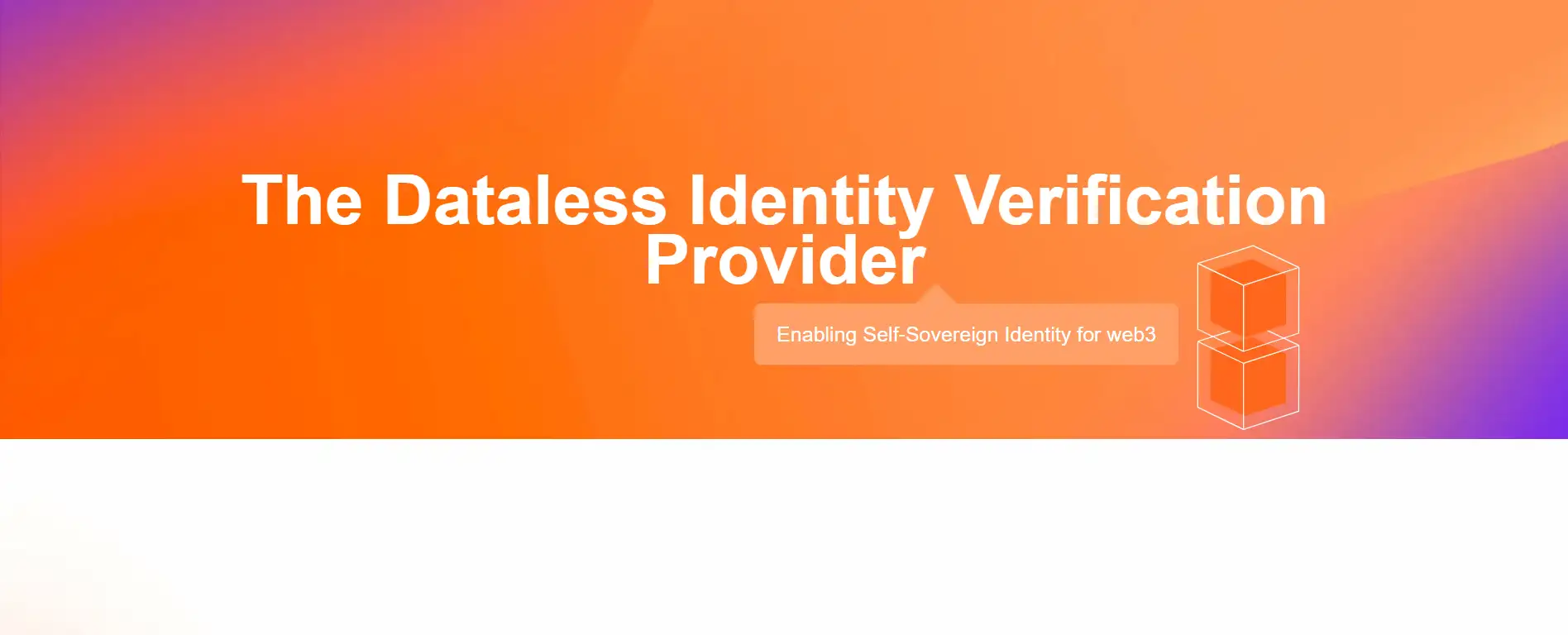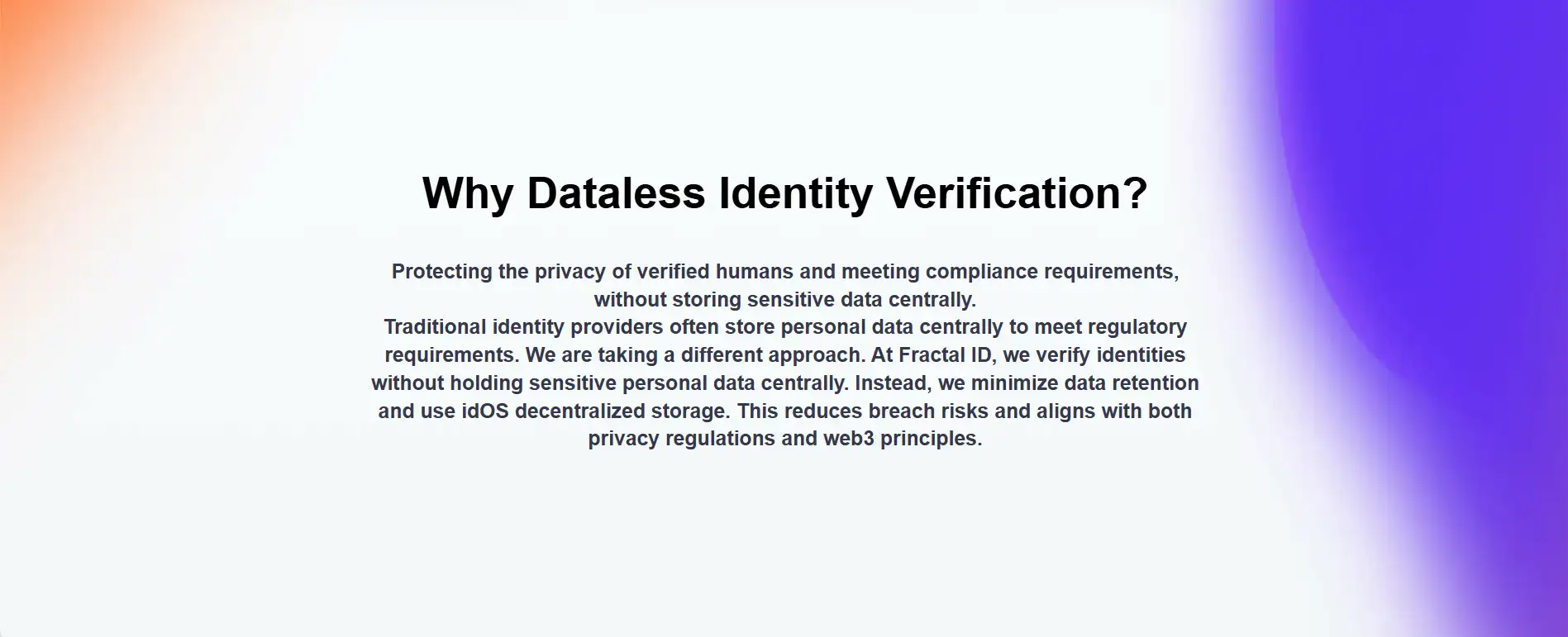About Fractal
Fractal is a privacy-first identity verification platform built for web3 applications that demand both regulatory compliance and user sovereignty. Rather than storing sensitive data in centralized databases, Fractal verifies users and then encrypts their identity information as verifiable credentials stored on a decentralized network known as idOS. This approach empowers users to retain control over their personal data, while still satisfying KYC, KYB, and compliance standards required by modern crypto ecosystems.
Whether you're building a DeFi protocol, launchpad, decentralized exchange, or social platform, Fractal ensures your platform can verify users securely without compromising on decentralization or data privacy. The platform is trusted across a wide array of use cases—from real-world asset tokenization to DAO governance—thanks to its flexible identity verification architecture and commitment to ethical data handling.
Fractal redefines identity verification for the decentralized era. The platform was designed in response to the growing need for secure, regulation-compliant identity solutions that do not rely on vulnerable centralized storage systems. Traditional KYC providers tend to store massive amounts of user data, increasing the risk of breaches and violating privacy-first principles of web3. Fractal offers a radical departure from this model by introducing dataless identity verification, an approach that stores verified credentials in a decentralized, encrypted format through the idOS protocol.
The platform works in phases: once a user completes verification, their personally identifiable data is retained only for a short 14-day window for processing purposes, then permanently deleted from all centralized systems involved in the process. Credentials are issued and stored on idOS, a decentralized self-sovereign network specifically designed to house identity data securely. This gives users the ability to manage their own credentials, granting and revoking access to dApps and platforms as needed.
Developers and platforms using Fractal benefit from seamless integration of identity services while maintaining the trust of users who value data ownership. For applications requiring compliance—such as on/off-ramps, exchanges, token sales, and DeFi lending platforms—Fractal offers customizable identity verification levels that suit both user needs and legal requirements. Meanwhile, use cases like social dApps, gaming worlds, or reputation systems can leverage Fractal’s human verification tools to protect against bots and sybil attacks.
Fractal’s integration is already being used in a variety of verticals, including AR/VR applications, NFT-based communities, DAO voting systems, and launchpads hosting public or private token sales. Its architecture also ensures GDPR compliance and enables selective data sharing under explicit user consent, reinforcing its commitment to ethical data practices.
In an ecosystem filled with legacy KYC providers and siloed identity systems, Fractal stands out by aligning compliance with user autonomy. It’s ideal for any project aiming to stay legally compliant while remaining fully decentralized. Comparable players in the space include Jumio, Persona, and Veriff, but Fractal’s dataless architecture and decentralized philosophy set it apart.
Fractal offers a number of powerful features and advantages that make it ideal for next-gen web3 platforms:
- Dataless Architecture: Identity data is not stored centrally. After a 14-day buffer period, it’s permanently deleted, with verifiable credentials stored on the decentralized idOS network.
- GDPR-Compliant by Design: Fractal ensures full regulatory alignment with global data privacy laws while maintaining decentralization.
- User-Controlled Access: Verified users hold their own credentials and can grant or revoke access to any platform or dApp, giving them full sovereignty over their identity.
- Use Case Flexibility: Tailored solutions for DeFi platforms, launchpads, RWA tokenization, DAOs, DEXs, and more.
- Security-First Model: Fractal limits attack vectors by minimizing retention and decentralizing credential storage, significantly lowering breach risks.
- Interoperable Ecosystem: Compatible with any web3 application, with APIs and SDKs that make integration simple and scalable.
- Real Human Verification: Tools to prove uniqueness and combat sybil attacks for DAOs, social platforms, airdrops, and games.
Getting started with Fractal is quick, secure, and tailored to your platform’s compliance and verification needs:
- Visit the Website: Begin by exploring Fractal’s official site to understand their dataless verification model.
- Review Solutions: Head to the Solutions section to explore offerings for DeFi apps, tokenization protocols, exchanges, and governance platforms.
- Access Documentation: Developers can visit the Developer Docs to learn how to integrate Fractal’s identity API and credential management system.
- Reach Out: For custom integration support or business collaboration, email [email protected].
- Stay Updated: Follow the Fractal blog for updates on the product roadmap, open-source initiatives, and industry commentary.
Fractal FAQ
Fractal eliminates the need for centralized data storage by issuing verifiable credentials after verification and storing them on idOS, a decentralized identity network. Unlike traditional KYC providers who store user data indefinitely, Fractal deletes all personal data after a 14-day buffer period, significantly reducing the risk of data breaches and aligning with web3’s values of privacy and decentralization.
Fractal is built from the ground up to comply with GDPR and other major privacy regulations. All personally identifiable information is deleted from centralized systems post-verification, and users maintain self-sovereign control of their identity data through encrypted credentials stored on idOS. Platforms can only access user data if granted explicit permission, keeping the process both secure and lawful. Learn more at Fractal.
Yes. Fractal empowers users with full control over their identity through Access Grants. These are permission tokens that platforms must obtain from users in order to view or update credentials. Users can revoke access at any time, reinforcing the principles of self-sovereign identity. This ensures that users always decide who can interact with their data. See more at Fractal.
After the initial identity verification, your personal data is held for a brief 14-day window to support verification continuity. After that period, Fractal deletes it permanently from all centralized databases, including those of any partner providers. Only anonymized system IDs and metadata logs are retained, ensuring privacy without compromising on functionality. For full details, visit Fractal.
DeFi platforms that integrate Fractal can offer users seamless KYC/AML compliance without centralizing data, making it easier to onboard users while protecting their privacy. Fractal’s dataless architecture also helps reduce regulatory risks, increase user trust, and ensure eligibility for integrations with compliant financial systems. Learn more about DeFi use cases at Fractal.
You Might Also Like












